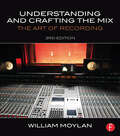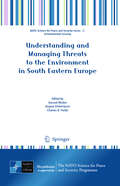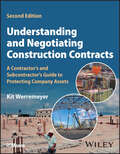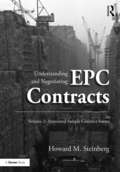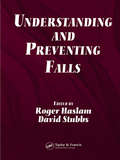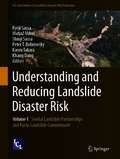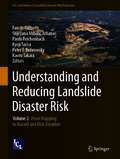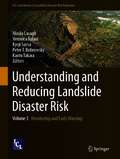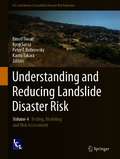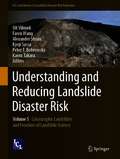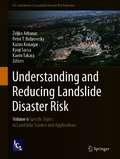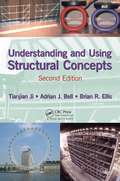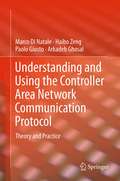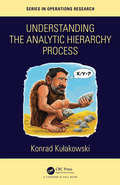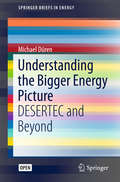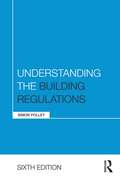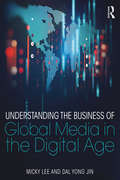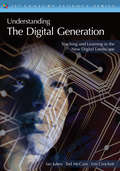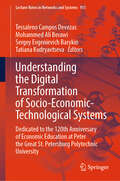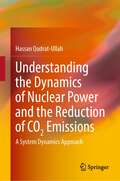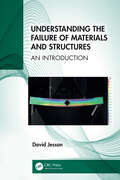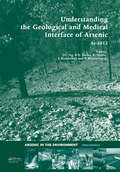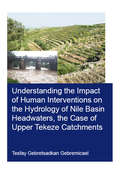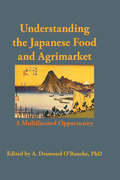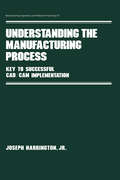- Table View
- List View
Understanding and Crafting the Mix: The Art of Recording (The\art Of Recording Ser.)
by William MoylanUnderstanding and Crafting the Mix, 3rd edition provides the framework to identify, evaluate, and shape your recordings with clear and systematic methods. Featuring numerous exercises, this third edition allows you to develop critical listening and analytical skills to gain greater control over the quality of your recordings. Sample production sequences and descriptions of the recording engineer’s role as composer, conductor, and performer provide you with a clear view of the entire recording process. Dr. William Moylan takes an inside look into a range of iconic popular music, thus offering insights into making meaningful sound judgments during recording. His unique focus on the aesthetic of recording and mixing will allow you to immediately and artfully apply his expertise while at the mixing desk. A companion website features recorded tracks to use in exercises, reference materials, additional examples of mixes and sound qualities, and mixed tracks.
Understanding and Managing Threats to the Environment in South Eastern Europe
by Charles B. Fields Gorazd Meško Dejana DimitrijevićThis volume presents reflections on a variety of environmental issues in South-Eastern Europe from diverse contemporary scientific disciplines. The contributions address many crucial issues including national environmental policies, economic instruments for preventing crimes against the environment, international waste trafficking, threats to air, water and soil due to mining, management of dump areas, environment protection and food safety from a perspective of public health. The book will be a useful resource for researchers, developers and decision makers interested in the stability and sustainable development of the South-Eastern European countries.
Understanding and Negotiating Construction Contracts: A Contractor's and Subcontractor's Guide to Protecting Company Assets
by Kit WerremeyerUnderstanding and Negotiating Construction Contracts The complexities of construction contracts are made easy with this thorough and readable guide Construction contracts can be complex for both owners and contractors. For contractors, negotiating fair and balanced commercial terms in contracts is just as important as properly managing projects; a properly negotiated contract can mitigate unnecessary risk and unnecessary risk transfer. This, in turn, reduces exposure to financial liability for the contractor and for avoidance of contract claims and disputes. Understanding and Negotiating Construction Contracts provides a comprehensive and readable introduction to the world of construction contracts. Providing, for example, coverage of the four most common types of contracts—lump sum/fixed-price, cost-plus, time-and-materials, and unit-pricing—it promises to reduce uncertainty and allow contractors to enter contractual negotiations with greater confidence to be able to achieve a fair and balanced contract. This updated new edition reflects the up-to-date best practices to understand how to better negotiate the commercial terms and conditions in construction contracts. Readers of the second edition of Understanding and Negotiating Construction Contracts will also find: Updated information on indemnity, insurance, and negotiation An all-new chapter with a contract analysis checklist Real-world examples drawn from small residential, retail, large commercial, and international projects Understanding and Negotiating Construction Contracts is essential for construction professionals and college students studying construction contracts and the liabilities arising out of them.
Understanding and Negotiating EPC Contracts, Volume 2: Annotated Sample Contract Forms
by Howard M. SteinbergAny project which involves an EPC contract is also likely to involve a number of other complicated contracts. The challenge of the parties to an EPC contract is not to try to eliminate risk but rather put into place a narrative structure that enables the parties to predict the contractual result that would obtain if a risk materializes. If the EPC contract does not allow the parties to determine the consequences of an unanticipated situation, they will have to look to an expert, mediator, tribunal, or court to impart guidance or pass judgment. The sample forms of contract contained in Volume 2 of Understanding and Negotiating EPC Contracts are intended to serve as a guide to demonstrate how risks and responsibilities can be allocated among project sponsors, EPC contractors and the various other parties that may be involved in a project. Collectively the sample forms in this volume offer an extraordinary resource that provides the benefit of lessons learned and priceless insight into any project being undertaken which can help assure the resilience of any EPC project.
Understanding and Preventing Falls: An Ergonomics Approach
by David Stubbs Roger HaslamReadable and authoritative, Understanding and Preventing Falls provides a guide to the nature and extent of the problem of falls. Drawing on the latest research, the authors outline the combination of environmental factors that commonly lead to falls and explore how to prevent them. The case is made for a multifaceted approach to falls prevention,
Understanding and Reducing Landslide Disaster Risk: Volume 1 Sendai Landslide Partnerships and Kyoto Landslide Commitment (ICL Contribution to Landslide Disaster Risk Reduction)
by Peter T. Bobrowsky Kyoji Sassa Matjaž Mikoš Khang Dang Kaoru Takara Shinji SassaThis book is a part of ICL new book series “ICL Contribution to Landslide Disaster Risk Reduction” founded in 2019. Peer-reviewed papers submitted to the Fifth World Landslide Forum were published in six volumes of this book series. This book contains the followings:• Four Forum lectures and one award paper• Sendai Landslide Partnerships, Kyoto Landslide Commitment, and International Programme on Landslides.• Landslide-induced tsunamis• Landslides at UNESCO designates sites and contribution from WMO, FAO, and IRDR• Education and Capacity Development for Risk Management and Risk GovernanceProf. Kyoji Sassa is the Founding President and the Secretary-General of International Consortium on Landslides (ICL). He has been the Editor-in-Chief of International Journal Landslides since its foundation in 2004.Prof. Matjaž Mikoš is the Vice President of International Consortium on Landslides and Vice President of Slovenian Academy of Engineering. He is a Professor and Dean of Faculty of Civil and Geodetic Engineering, University of Ljubljana, Slovenia.Dr. Shinji Sassa is Head of Soil Dynamics Group and Research Director of International Research Center for Coastal Disasters, Port and Airport Research Institute, National Institute of Maritime, Port and Aviation Technology, Japan.Prof. Peter Bobrowsky is the President of International Consortium on Landslides. He is a Senior Scientist of Geological Survey of Canada, Ottawa, Canada.Prof. Kaoru Takara is the Executive Director of International Consortium on Landslides. He is a Professor and Dean of Graduate School of Advanced Integrated Studies (GSAIS) in Human Survivability (Shishu-Kan), Kyoto University.Dr. Khang Dang is the Secretary General of the Fifth World Landslide Forum. He also serves as the Research Promotion Officer of ICL and a Lecturer at the University of Science, Vietnam National University, Hanoi.
Understanding and Reducing Landslide Disaster Risk: Volume 2 From Mapping to Hazard and Risk Zonation (ICL Contribution to Landslide Disaster Risk Reduction)
by Peter T. Bobrowsky Kyoji Sassa Fausto Guzzetti Kaoru Takara Snježana Mihalić Arbanas Paola ReichenbachThis book is a part of ICL new book series “ICL Contribution to Landslide Disaster Risk Reduction” founded in 2019. Peer-reviewed papers submitted to the Fifth World Landslide Forum were published in six volumes of this book series. This book contains the followings:• Keynotes• Landslide detection, recognition and mapping• Landslide susceptibility assessment and modelling• Landslide size statistics and temporal modelling• Data and information for landslide disaster mitigation• Vulnerability to landslides of people, communities and the built environmentDr. Fausto Guzzetti is General Director of Office III – Technical and Scientific Activities for Risk Forecasting and Prevention, Department of Civil Protection, Italian Presidency of the Council of Ministers, on leave from the Italian National Research Council.Prof. Snježana Mihalić Arbanas is a Full Professor of the Faculty of Mining, Geology and Petroleum Engineering of the University of Zagreb, Croatia. She is the Chair of ICL Network Committee.Paola Reichenbach is a Senior Researcher of the Research Institute for Geo-Hydrological Protection, an institute of the Italian National Research Council (IRPI-CNR), Perugia, Italy.Prof. Kyoji Sassa is the Founding President and the Secretary-General of the International Consortium on Landslides (ICL). He has been the Editor-in-Chief of International Journal Landslides since its foundation in 2004.Prof. Peter Bobrowsky is the President of the International Consortium on Landslides. He is a Senior Scientist of Geological Survey of Canada, Ottawa, Canada.Prof. Kaoru Takara is the Executive Director of the International Consortium on Landslides. He is a Professor and Dean of Graduate School of Advanced Integrated Studies (GSAIS) in Human Survivability (Shishu-Kan), Kyoto University.
Understanding and Reducing Landslide Disaster Risk: Volume 3 Monitoring and Early Warning (ICL Contribution to Landslide Disaster Risk Reduction)
by Peter T. Bobrowsky Kyoji Sassa Nicola Casagli Kaoru Takara Veronica TofaniThis book is a part of ICL new book series “ICL Contribution to Landslide Disaster Risk Reduction” founded in 2019. Peer-reviewed papers submitted to the Fifth World Landslide Forum were published in six volumes of this book series. This book contains the followings:• One theme lecture and one keynote lecture• Monitoring and remote sensing for landslide risk mitigation, including one keynote lecture• Landslide early warning systems, forecasting models and time prediction of landslidesProf. Nicola Casagli is a Vice President and President-elect of the International Consortium on Landslides (ICL) for 2021–2023. He is Professor of engineering geology at the Department of Earth Sciences, University of Florence, and President of the National Institute of Oceanography and Applied Geophysics – OGS, Trieste, Italy.Dr. Veronica Tofani is an Associate Professor at the Department of Earth Sciences, University of Florence, and Program Coordinator of the UNESCO Chair on Prevention and Sustainable Management of Geo-hydrological hazards, University of Florence.Prof. Kyoji Sassa is the Founding President and the Secretary-General of the International Consortium on Landslides (ICL). He has been the Editor-in-Chief of International Journal Landslides since its foundation in 2004.Prof. Peter Bobrowsky is the President of the International Consortium on Landslides. He is a Senior Scientist of Geological Survey of Canada, Ottawa, Canada.Prof. Kaoru Takara is the Executive Director of the International Consortium on Landslides. He is a Professor and Dean of Graduate School of Advanced Integrated Studies (GSAIS) in Human Survivability (Shishu-Kan), Kyoto University.
Understanding and Reducing Landslide Disaster Risk: Volume 4 Testing, Modeling and Risk Assessment (ICL Contribution to Landslide Disaster Risk Reduction)
by Peter T. Bobrowsky Kyoji Sassa Binod Tiwari Kaoru TakaraThis book is a part of ICL new book series “ICL Contribution to Landslide Disaster Risk Reduction” founded in 2019. Peer-reviewed papers submitted to the Fifth World Landslide Forum were published in six volumes of this book series. This book contains the followings:• Five keynote lectures• Recent development in physical modeling of landslides• Recent development in numerical modeling of landslides• Recent development in soil and rock testing techniques, application and analysis methods• Recent advancements in the methods of slope stability and deformation analyses• Recent development in disaster risk assessmentProf. Binod Tiwari is a Vice President of the International Consortium on Landslides (ICL). He is the Associate Vice President for research and sponsored project and Professor of civil and environmental engineering at the California State University, Fullerton, California, USA.Prof. Kyoji Sassa is the Founding President and the Secretary-General of the International Consortium on Landslides (ICL). He has been the Editor-in-Chief of International Journal Landslides since its foundation in 2004.Prof. Peter Bobrowsky is the President of the International Consortium on Landslides. He is a Senior Scientist of Geological Survey of Canada, Ottawa, Canada.Prof. Kaoru Takara is the Executive Director of the International Consortium on Landslides. He is a Professor and Dean of Graduate School of Advanced Integrated Studies (GSAIS) in Human Survivability (Shishu-Kan), Kyoto University.
Understanding and Reducing Landslide Disaster Risk: Volume 5 Catastrophic Landslides and Frontiers of Landslide Science (ICL Contribution to Landslide Disaster Risk Reduction)
by Peter T. Bobrowsky Fawu Wang Alexander Strom Kyoji Sassa Vít Vilímek Kaoru TakaraThis book is a part of ICL new book series “ICL Contribution to Landslide Disaster Risk Reduction” founded in 2019. Peer-reviewed papers submitted to the Fifth World Landslide Forum were published in six volumes of this book series. This book contains the followings:Part I with topics is mainly about landslides and earthquakes; landslide dams and outburst floods; catastrophic large-scale landslides in mountainous regions.Part II with topics is mainly about impact of climate change; loess landslides; mapping, monitoring and modeling of landslides; stabilization and mitigation; application of new technology in landslide studies.Prof. Vít Vilímek is the vice-president of the International Consortium on Landslides (ICL) and a member of the evaluation committee, Editor-in-Chief of the university journal AUC Geographica and Associate Editor-in-Chief of the international journal Geoenvironmental Disasters. He is a Professor of Physical Geography at Charles University, Prague, Czech Republic.Prof. Fawu Wang is the President of the International Consortium on Geo-disaster Reduction (ICGdR) and the Editor-in-Chief of the international journal Geoenvironmental Disasters. He is a Professor at the School of Civil Engineering, Tongji University, China.Dr. Alexander Strom is a chief expert at the Geodynamics Research Center LLC, Moscow, Russia. He is also an Adjunct Professor at Chang’an University, Xi’an, China, Visiting Professor at SKLGP, Chengdu, China, and an alternative representative of the JSC “Hydroproject Institute” in ICL.Prof. Kyoji Sassa is the Founding President and the Secretary-General of the International Consortium on Landslides (ICL). He has been the Editor-in-Chief of International Journal Landslides since its foundation in 2004.Prof. Peter Bobrowsky is the President of the International Consortium on Landslides. He is a Senior Scientist of Geological Survey of Canada, Ottawa, Canada.Prof. Kaoru Takara is the Executive Director of the International Consortium on Landslides. He is a Professor and Dean of Graduate School of Advanced Integrated Studies (GSAIS) in Human Survivability (Shishu-Kan), Kyoto University.
Understanding and Reducing Landslide Disaster Risk: Volume 6 Specific Topics in Landslide Science and Applications (ICL Contribution to Landslide Disaster Risk Reduction)
by Peter T. Bobrowsky Kyoji Sassa Željko Arbanas Kaoru Takara Kazuo KonagaiThis book is a part of ICL new book series “ICL Contribution to Landslide Disaster Risk Reduction” founded in 2019. Peer-reviewed papers submitted to the Fifth World Landslide Forum were published in six volumes of this book series. This book contains the following parts:• Impact of Large Ground Deformations near Seismic Faults on Critically Important Civil Infrastructures• Recent Progress in the Landslide Initiating Science• Earth Observation and Machine Learning in Landslide Science• General Landslide StudiesProfessor Željko Arbanas is the Vice President of International Consortium on Landslides. He is a Professor of Faculty of Civil Engineering, University of Rijeka, Croatia. He is the Assistant Editor-in-Chief of International Journal Landslides.Professor Peter Bobrowsky is the President of International Consortium on Landslides. He is a Senior Scientist of Geological Survey of Canada, Ottawa, Canada.Professor Kazuo Konagai is Professor Emeritus at the University of Tokyo and Principal Researcher at the ICL Headquarters. He serves as the Secretary-General of the Fifth World Landslide Forum.Professor Kyoji Sassa is the Founding President and the Secretary-General of the International Consortium on Landslides (ICL). He has been the Editor-in-Chief of International Journal Landslides since its foundation in 2004.Professor Kaoru Takara is the Executive Director of International Consortium on Landslides. He is a Professor and Dean of Graduate School of Advanced Integrated Studies (GSAIS) in Human Survivability (Shishu-Kan), Kyoto University.
Understanding and Using Structural Concepts
by Tianjian Ji Adrian J. Bell Brian R. EllisUnderstanding and Using Structural Concepts, Second Edition provides numerous demonstrations using physical models and practical examples. A significant amount of material, not found in current textbooks, is included to enhance the understanding of structural concepts and stimulate interest in learning, creative thinking, and design. This is achiev
Understanding and Using the Controller Area Network Communication Protocol
by Paolo Giusto Arkadeb Ghosal Haibo Zeng Marco Di NataleThis book to offers a hands-on guide to designing, analyzing and debugging a communication infrastructure based on the Controller Area Network (CAN) bus. Although the CAN bus standard is well established and currently used in most automotive systems, as well as avionics, medical systems and other devices, its features are not fully understood by most developers, who tend to misuse the network. This results in lost opportunities for better efficiency and performance. These authors offer a comprehensive range of architectural solutions and domains of analysis. It also provides formal models and analytical results, with thorough discussion of their applicability, so that it serves as an invaluable reference for researchers and students, as well as practicing engineers.
Understanding the Analytic Hierarchy Process (Chapman & Hall/CRC Series in Operations Research)
by Konrad KulakowskiThe aim of this book is to provide the reader with a critical guide to AHP. In this book, the AHP method is considered primarily as a mathematical technique supporting the decision-making process. This method provides a convenient and versatile framework for modelling multi-criteria decision problems, evaluating alternatives and deriving final priorities. Rather than imposing a correct decision, AHP allows the user to create a ranking of alternatives, then choose the one which is the best (or among the best). At the core of AHP is a pairwise comparisons (PC) method. This is an old technique known in various forms since at least the Middle Ages.
Understanding the Bigger Energy Picture: DESERTEC and Beyond (SpringerBriefs in Energy)
by Michael DürenThis book is open access under a CC BY 4.0 license.This book focuses on the global cycles of energy, water and carbon, which are not only the essentials of our main energy carriers, the fossil fuels, but are also the building blocks of life. The book offers an overview of the basic scientific facts and relationships that are needed to understand today’s energy generation and use, how they relate to global climate, the water cycle and other resources, and the complexities of energy policy. Building on the work of the Desertec project, it presents the main technological options that we will have in a world after the “Energiewende” and presents the possible future solutions for a sustainable world. The book is written in an engaging, descriptive style that can be understood by those without specific knowledge of science or economics and allows readers to form their own conclusions. Controversy rages over energy problems, climate change and their possible solutions. Expressions like “climate deniers”, “renaissance of nuclear energy”, “stop the war on coal”, and “Energiewende now” represent a diversity of opinions that divide our society and political leaders. This book shows the reader the whole energy picture and how it is part of the wider global problems of overpopulation and uncontrolled economies in a world of limited resources.
Understanding the Building Regulations
by Simon PolleyDo you need a concise, jargon-free and compact guide to the UK building regulations? Simon Polley boils down the regulations to their basic features, explaining the core principles behind them. Easy to read and light enough to carry around with you, this is the ideal introduction to a vital part of your remit as a building control officer, architect or surveyor. Updated with the extensive 2013 changes, and illustrated with cartoons and diagrams.
Understanding the Business of Global Media in the Digital Age
by Dal Yong Jin Micky LeeThis new introductory textbook provides students with the tools they need to understand the way digital technologies have transformed the global media business of the 21st century. Focusing on three main approaches – media economics, critical political economy, and production studies – the authors provide an empirically rich analysis of ownership, organizational structures and culture, business strategies, markets, networks of strategic alliances, and state policies as they relate to global media. Examples throughout involve both traditional and digital media and are taken from different regions and countries to illustrate how the media business is influenced by interconnected historical, political, economic, and social factors. In addition to introducing today’s convergent world of global media, the book gives readers a greater understanding of their own potential roles within the global media industries.
Understanding the Digital Generation: Teaching and Learning in the New Digital Landscape
by Ian Jukes Lee Crockett Ted McCainAn innovative look at reshaping the educational experiences of 21st-century learners! Inspiring thoughtful discussion that leads to change, this reader-friendly resource examines how the new digital landscape is transforming teaching and learning in an environment of standards, accountability, and high-stakes testing and why informed leadership is so critical. The authors present powerful strategies and compelling viewpoints, underscore the necessity of developing relevant classroom experiences, and discuss: Attributes common among digital learners; The concepts of neuroplasticity and the hyperlinked mind; An educational approach that supports traditional literacy skills alongside 21st-century fluencies; Evaluation methods that encompass how digital generation students process new information.
Understanding the Digital Transformation of Socio-Economic-Technological Systems: Dedicated to the 120th Anniversary of Economic Education at Peter the Great St. Petersburg Polytechnic University (Lecture Notes in Networks and Systems #951)
by Tatiana Kudryavtseva Mohammed Ali Berawi Tessaleno Campos Devezas Sergey Evgenievich BarykinThis book is dedicated to the 120th anniversary of economic education at Peter the Great St. Petersburg Polytechnic University (SPbPU). It gathers the best and most recent research materials of scientists from SPbPU’s Institute of Industrial Management, Economics and Trade and their colleagues from other universities.This book reflects many years of experience, unique results and interesting discoveries made by collaborative teams exploring the following issues: engineering economics, sustainable development and other topics related to the digitalization of enterprises, industries and systems; digital transformation of the service market in the face of global challenges; automation of enterprise control systems, digital and data management solutions for business; socio-economic development and territorial management in the era of Industry 4.0, etc. This book offers various views on challenges faced by today's economy and industry that are undoubtedly relevant to readers of almost all categories: from students to practitioners and scientists, but mostly for researchers.
Understanding the Dynamics of Nuclear Power and the Reduction of CO2 Emissions: A System Dynamics Approach
by Hassan Qudrat-UllahThis books explains a strategy that a country can meet its CO2 emission reduction targets (e.g., as are in Paris Agreement) with a dominant share of nuclear power with a balanced energy supply mix. The book starts with an introduction to the subject of energy policy, mechanisms, and CO2 emissions, and the complexity of the CO2 reduction goal. It introduces the system dynamics approach as a solution modeling approach for dealing with the complexity of CO2 reducing policies and mechanisms. The book presents the dynamic model and its key parameters and then elaborates the structural and behavioral validity of the dynamic model. The book gives an intensive review to do that comparative analysis involving China, India, Saudi Arabia, UAE, and Pakistan. The last half of the book focuses on the case in Pakistan. The author reviews Pakistan’s Intended Nationally Determined Contribution and other key sources from Pakistan’s Ministry of Energy and related institutions. Using Pakistan’s case data, the author applies the system dynamics modeling approach whereby a dynamic model, capable of representing the important interactions among various sectors of the electricity supply sector of Pakistan. This book is intended to be of use to policymakers, managers and practitioners, teachers, researchers, and students of design and assessment of policymaking for the complex, dynamic energy systems
Understanding the Failure of Materials and Structures: An Introduction
by David JessonUnderstanding the Failure of Materials and Structures introduces practical aspects of mechanical characterisation of materials and structures. It gives those with little or no prior experience insight into the process of developing everyday products, issues behind some high-profile failures, and tools to begin planning a programme of research.Written in an easily accessible manner, the work discusses fundamentals of the physical world, highlighting the range of materials used and varied applications, and offers a brief history of materials development. It covers the role of materials structure in controlling materials properties and describes mechanical properties, such as stress, strain, stiffness, fracture, and fatigue. The book also features information on various modes of testing and strain measurement. It provides some discussion on topics that go beyond well-behaved test coupons, with thoughts on biomechanics, megastructures, and testing for applications in extreme environments. Finally, it covers how materials fail and the future of physical testing.With minimal theory and mathematics, this work presents the fundamentals of mechanical characterisation of materials and structures in a manner accessible to the novice materials investigator and the layperson interested in the science behind materials engineered for use in common and advanced products.
Understanding the Geological and Medical Interface of Arsenic - As 2012: Proceedings of the 4th International Congress on Arsenic in the Environment, 22-27 July 2012, Cairns, Australia (Arsenic in the Environment - Proceedings)
by Jochen Bundschuh Prosun Bhattacharya Ravi Naidu Jack C. Ng Barry N. NollerThe congress "Arsenic in the Environment" offers an international, multi- and interdisciplinary discussion platform for arsenic research aimed at practical solutions of problems with considerable social impact, as well as focusing on cutting edge and breakthrough research in physical, chemical, toxicological, medical and other specific issues on ar
Understanding the Impact of Human Interventions on the Hydrology of Nile Basin Headwaters, the Case of Upper Tekeze Catchments (IHE Delft PhD Thesis Series)
by Tesfay Gebretsadkan GebremicaelThe availability and distribution of water resources in catchments are influenced by various natural and anthropogenic factors. Human-induced environmental changes are key factors controlling the hydrological flows of semi-arid catchments. Land degradation, water scarcity and inefficient utilization of available water resources continue to be important constraints for socio-economic development in the headwater catchments of the Nile river basin in particular over the Ethiopian Catchments. This research investigates the impact of landscape anthropogenic changes on the hydrological processes in the Upper Tekeze basin (A tributary of the Nile). The hydrology of the basin is investigated through analysis of hydro-climatic data, remote sensing techniques, new field measurements and parsimonious hydrological models. The empirical evidence provided in this book confirms that human-induced environmental changes can significantly change the hydrology of catchments, both in negative (degradation) and in positive (restoration) ways. This book also shows that rainfall-runoff relationships in semi-arid catchments are non-uniform and hence the application of hydrological models in such catchments need special attention. Moreover, parsimonious dynamic hydrological model improves our understanding of the hydrological response to dynamic environmental changes.
Understanding the Japanese Food and Agrimarket: A Multifaceted Opportunity
by Andrew D O'RourkeThe contributing authors of Understanding the Japanese Food and Agrimarket discuss broad forces that affect markets in Japan and specific situations faced in marketing grain, livestock, and seafood products; fruits; vegetables; and wood products. Many of the contributors speak and read Japanese and have lived in Japan for extensive periods; they are able to give deep insights into how and why the Japanese consumption and distribution system behaves as it does. They draw on their expertise to fully explore various Japanese food and fiber markets. As they demystify the Japanese market, they illustrate for readers several systematic approaches to mastering the Japanese food and fiber markets.Readers will discover that effective long-term marketing strategies in Japan must be based on sound analytical information. The contributors provide such needed material with chapters on items as diverse as wine, grain products, beef, and fruits and vegetables. Some of the specific topics covered include:changes in Japanese food consumptionJapanese food distribution systemdemand for beef products in Japandemand for vegetables and vegetable seedsJapanese wine marketdemand for bakery productsnew food products for the Japanese marketdeveloping trade relations in wood productsExecutives of commodity associations or firms exporting foods to Japan will find the general sections most interesting as well as chapters specific to their products. Teachers and students exploring exporting to the Japanese market will be intrigued by the various dimensions of the “multifaceted” nature and opportunities of the Japanese market.
Understanding the Manufacturing Process: Key to Successful Cad/cam Implementation
by Joseph Harrington Jr.This book approaches manufacturing as a basic problem of making a desired end-product from bulk raw materials. It encompasses the entire gamut of activities from product concept to maintenance of past products in the field, and everything in between.
